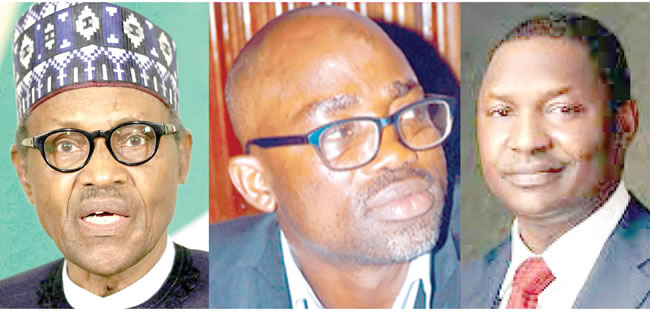The Socio-Economic Rights and Accountability Project (SERAP) is a civil society known for keeping government on its toes especially through litigations. Indeed, the presidency attacked the organisation, alleging that it is sponsored to file spurious charges against it while SERAP insists it is to ensure transparency and accountability in the fight against corruption. YEJIDE GBENGA-OGUNDARE reports that while opinions differ on the situation, SERAP believes in its pursuit of accountability.
On Wednesday, December 1, 2021, the presidency, in a statement signed by the Senior Special Assistant to the President on Media & Publicity, Garba Shehu, accused a renowned Lagos-based civil society organisation and human rights advocate, the Socio-Economic Rights and Accountability Project (SERAP) of engaging in what it described as publicity stunts through filing spurious litigations against President Muhammadu Buhari.
Shehu alleged that despite filing numerous suits against the president, SERAP has not managed to pursue any of it to conclusion and had continued to sue President Buhari over a range of issues including human rights abuses.
The presidency casted aspersions on the activities of SERAP, suggesting that the organisation is raising repeated ridiculous claims and legal action against the government and the president. This, it described, as the fulfillment of its obligations to unknown sponsors, adding that “very little is known about SERAP or who funds them – despite their claims of being an organisation that champions transparency and accountability.
“To date, SERAP has announced on repeated occasions – each time via a well-funded media campaign – that it is suing the government or president over a range of issues from alleged human rights abuses to alleged corruption.To date, SERAP has not taken their retinue of legal actions to a logical conclusion. They don’t follow through.
“Yet these headline-grabbing publicity stunts, however baseless, succeed in painting an inaccurate picture of life and governance in Nigeria and – more seriously – in sowing division amongst the Nigerian people during a time of heightened global economic volatility and hardship.”
He had called on SERAP “to cease its divisive, irresponsible and bare-faced publicity stunts and instead to follow through on its latest spurious legal claim in a Nigerian court of law.”
SERAP, created in 2004, prides itself as an institution focused on promoting transparency and respect for socio-economic rights. And according to its Executive Director, Adetokunbo Mumuni, over the years, SERAP, recognising the unexplored potential of international human rights law for increasing transparency, accountability and protection of economic and social rights in Nigeria, was created to promote these principles and values by using human rights law to encourage the government and others to address developmental and human rights challenges such as corruption, poverty, inequality and discrimination.
However, there is a belief that SERAP has mastered the art of dragging the Federal Government to court on every issue and some even wonder how the organisation keeps up with its litany of court cases against the government, both locally and internationally. At present, the Federal Government is facing several court cases instituted by SERAP. And while it has a truckload of cases, the organisation has won some and lost others.
When the Federal Government made it known that it planned on increasing electricity tariff and petrol pump price during the COVID-19 pandemic crisis, SERAP filed a suit before an Abuja Federal High Court on the ground that the move was antithetical to public interest, the common good, and a fundamental breach of the constitutional oath of office.
Further, SERAP, in one of its suits, sought an injunction from a Federal High Court sitting in Lagos to stop the police from harassing the #EndSARS protesters and other peaceful protests. In the aftermath of the shooting at Lekki tollgate, SERAP announced plans to drag the president to the International Criminal Court (ICC) over the October 20, 2021 incident.
It also filed suits on alleged police brutality in Abuja, Lagos, Edo, Oyo, Osun, Plateau, and Kano states as well as the Twitter ban by the Federal Government.
Other cases by SERAP include suit number FHC/L/CS/964/2016, SERAP v. Minister of Information; suit number FHC/IKJ/CS/248/2011, The Accountant General of the Federation and Attorney General of the Federation; FHC/L/CS/1821/2017, SERAP v. President of the Federal Republic of Nigeria and Attorney General of the Federation; FHC/L/CS/1497/2017, SERAP v. Attorney General of the Federation; FHC/L/CS/1821/2017, SERAP v. Minister of Power and ECW/CCJ/APP/2008 filed at the ECOWAS Community Court of Justice between SERAP v. Federal Republic of Nigeria & Universal Basic Education Commission (UBEC).
And while SERAP won some, it lost others. In the suit against the Minister of Information, the court held that the relief sought by SERAP succeeds being a “declaration that by virtue of Section 4(a) of the FOI Act 2011, the Defendants/Respondents are under a binding legal obligation to provide the Plaintiff/Applicant with up to date information relating to the following: (a.) information about the names of high-ranking public officials from whom funds were recovered since May, 2015.”
In the suit between SERAP vs Accountant General of the Federation and the Attorney General of the Federation on February 26, 2016, Justice M.B. Idris ruled that “a declaration is hereby made that the failure and/or refusal of the respondents to individually and/or collectively disclose detailed information about the spending of recovered stolen public funds since the return of civil rule in 1999, and to publish widely such information, including on a dedicated website, amounts to a breach of the fundamental principles of transparency and accountability and violates Articles 9, 21 and 22 of the African Charter on Human and Peoples’ Rights (Ratification and Enforcement) Act.”
Ruling in the suit between SERAP and the AGF on November 11, 2019, Justice Oluremi Oguntoyinbo ordered the Attorney General of the Federation and Minister of Justice to institute appropriate legal actions to challenge the legality of states’ laws permitting former governors, who are now senators and ministers, to enjoy governors’ emoluments while drawing normal salaries and allowances in their new political offices, and to identify those involved and seek full recovery of public funds from the former governors. In the judgment on July 4, 2019, Justice Chuka Austine Obiozor granted the application of SERAP demanding the Federal Government and the Ministry of Power to provide it with documents and information of specific names and details of contractors and companies that have been engaged in the power sector by succeeding governments since 1999 under the FOI Act.
But while SERAP won some of its cases, it also had the challenge of getting government to obey some orders as it has been said that the Federal Government has not complied with some of the judgments delivered in courts in favour of SERAP. Indeed, the Deputy Director of SERAP, Kolawole Oludare, had stated publicly that the Federal Government is yet to comply with any of the orders granted by the courts in favour of SERAP.
This was confirmed by a public affairs analyst, Sonala Olumhense, who said that the orders obtained from Nigerian courts by SERAP between 2016 and 2017 on recovered loots since 1999 has been continually ignored by government till now.
“In July 2017, Malami promised that his government would indeed honour those famous court orders, telling state house journalists that the government agreed with the courts. Again, in October of that year, in a meeting with SERAP in Abuja, Malami repeated the promise, claiming that Buhari had directed all the relevant agencies to compile documents on names of all “looters”, towards enforcing the court orders but it was a ruse,” Olumhese stated.
But why continually go to court when it seems it has no effect even when the court rules in SERAP’s favour, Oluwadare had once stated that its lawyers will not be in court to seek redress if the Nigerian government was complying with the Freedom of Information Act – an act that gives a person, group, association or organisation the right to access information from government agencies, parastatals, federal civil service, private and public sector organisations providing public services.
He had alleged that lack of transparency and accountability on the part of the federal, state governments and its agencies was why it continues to file suits in court, adding that the Federal Government was yet to disclose to Nigerians the money recovered from looters since 1999, reiterating then that while it has over 30 pending cases against government, it still engages in advocacy because the slow pace in court processes is a contributing factor, accusing the government of lacking the political will to abide by what the constitution says.
According to him, “we have cases against the Ministry of Health, Nigerian Broadcasting Corporation, Ministry of Finance, on various issues and aspects. Presently, we have almost 30 suits pending before the courts on matters of transparency and accountability, and it is interesting that majority of them are Freedom of Information suits.”
Speaking on the suits won against the Federal Government, Oludare said SERAP got a judgment in 2019 by the Federal High Court, Lagos, mandating the Attorney General of the Federation to take steps to challenge the legality of state pension laws. He has stated that suits filed by SERAP are not meant “to harass anyone, it is not meant to intimidate; they are issues of law and the court will have to make pronouncements. We have funding to do this work as part of the anti-corruption and human rights programs that we run like the MacArthur Foundation.
“That ultimately culminates in the litigation that we do to ensure that government is transparent and is accountable to the people. And to the extent that these issues are a public discourse and they are in court anyway, it might not be the kind of progress you may envisage but progress nonetheless towards the overall objective.”
On September 7, 2021, SERAP through its Deputy Director, Kolawole Oluwadare defended its numerous lawsuits against the government, adding that the several lawsuits against the government usually follow several request letters ignored by government agencies. He said, “before any deliberation about the lawsuit, SERAP would have written an open letter or advisory to some public officers or institutions by way of request for some specific things to be done.”
Speaking on SERAP’s Public impact and strategic litigation, Mumuni said “over the years, public impact and strategic litigation have become a major part of our work. Our public interest litigation work is based on the need to use law to support larger human rights struggles, and as an important tool of social change. While SERAP aims to secure a legal victory whenever litigation is undertaken, the organisation is also highly aware of the role of the litigation process beyond the orders made in court judgments.
“Apart from affording victims an effective remedy and redress, successful litigation can establish important legal precedents or effect changes in legislation, policy or practice. It can also positively influence public opinion. Any decision to litigate is based on defined case selection criteria, our own resources and expertise. Sometimes, outside experts are consulted to determine the potential for success of any particular case or research comparative jurisprudence on similar issues. Our litigation efforts go beyond filing and arguing cases in court to researching and filing a third party or amicus curiae briefs.”






